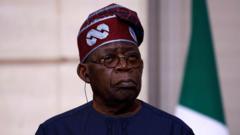With accusations of favoritism toward the Yoruba ethnic group in key appointments, critics voice concerns that Nigeria's historical efforts at ethnic balance are eroding, potentially threatening national unity.
Nigeria's Ethnic Balance at Risk as Concerns Rise Over Tinubu's Appointments

Nigeria's Ethnic Balance at Risk as Concerns Rise Over Tinubu's Appointments
A deepening rift in Nigeria’s political landscape may jeopardize the longstanding ethnic and religious balance in presidential appointments under President Bola Tinubu.
In Nigeria, the delicate dance of ethnic and religious balance in political appointments is facing serious scrutiny under President Bola Tinubu. Traditionally, there has been an unspoken agreement aiming to reflect the country’s diverse tapestry of over 250 ethnic groups through representation in key government roles. But emerging patterns in Tinubu’s selections suggest a departure from this convention, raising alarms among citizens and analysts alike.
Despite the constitution mandating regional representation in cabinet roles, there is unease that President Tinubu—a Yoruba Muslim—has disproportionately favored individuals from his own ethnic group in pivotal appointments since his election two years ago. His administration has been marked by accusations, particularly after the recent appointment of Bayo Ojulari, a Yoruba, to lead the Nigerian National Petroleum Company (NNPC), which replaced a northerner.
Critics argue that the entirety of the eight essential positions, which oversee the nation’s security and financial apparatus, being filled by Yorubas is unprecedented and potentially destabilizing. Political analysts fear that this trend could not only rekindle historical ethnic tensions but could also weaken faith in the democratic framework that has governed Nigeria since the return to civilian rule in 1999.
Under previous administrations, such as those of Goodluck Jonathan and Muhammadu Buhari, the distribution of key positions included a mixture of ethnic backgrounds, albeit with some criticisms surrounding perceived favoritism. However, critics argue that Tinubu has escalated this issue, as several key roles now under Yoruba leadership could leave northerners feeling marginalized.
The removal of Abdulrasheed Bawa, an influential Hausa head of the Economic and Financial Crimes Commission (EFCC) followed by the appointment of a Yoruba successor, has sparked outrage and claims of systemic bias. Many northerners have expressed concern that appointments must reflect Nigeria's pluralistic society, urging that all regions should have a share in governance.
Defense of Tinubu’s record has come from several officials, who contended that all appointments are being made within constitutional guidelines. Nonetheless, allegations persist that the current administration lacks a degree of inclusivity, straining national cohesion at a time when unity is paramount.
Political discourse within Tinubu's party— the All Progressives Congress— has revealed discontent, even from his northern counterparts who worry about the implications of such a one-sided approach. Tinubu himself has been called upon to acknowledge that Yoruba people represent only one facet of Nigeria's rich demographic landscape and that government should aptly reflect this diversity.
As the political landscape continues to evolve, it is uncertain whether Nigeria can transcend ethnic considerations in governance anytime soon. Observers hope for leadership that prioritizes national unity over ethnic allegiance, although the current trajectory raises questions about the very fabric of Nigeria’s democracy and future stability.

















